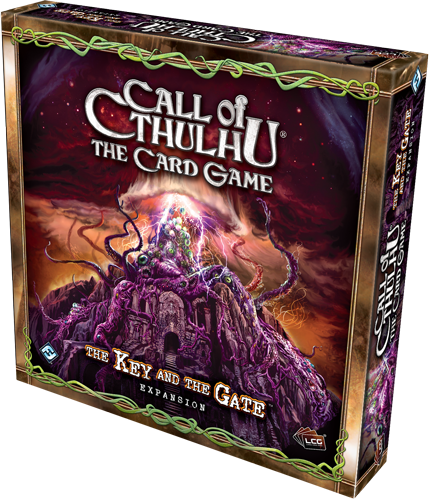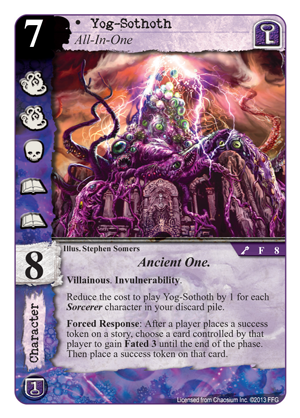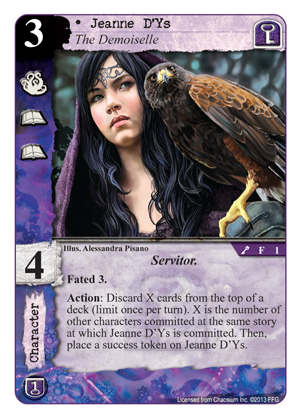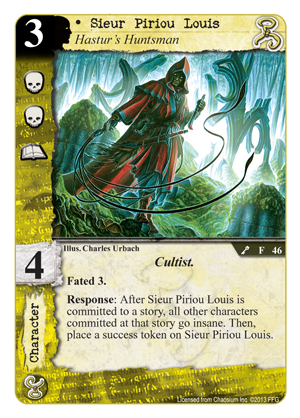
“Upon us depends more than can be put into words—all civilisation, all natural law, perhaps even the fate of the solar system and the universe.”
–H.P. Lovecraft,
The Case of Charles Dexter Ward
We humans like to think of ourselves as the protagonists of our own stories. On the personal level, we each perceive our days as strings of decisions and events unified by our participation and given weight by how they impact us. On the broader, social level, we tend to consider ourselves the protagonists of all history. We presume that we possess the only intelligences capable of grasping and directing the course of history, and this, naturally, makes us the authors of and main characters in the stories of our fates.
But what if we were wrong?

The Perils and Terrors of Call of Cthulhu: The Card Game
One of the most terrifying elements in all of H.P. Lovecraft’s fiction is the idea that we are not alone. We are not the only beings whose thought and will can shape landscapes, cross oceans, and power rockets that can race through the skies. What if other beings are capable of navigating vast spans of space and time as easily as we walk from one side of a room to the other? What if our existence continues only as the byproduct of their whims? What if these other beings are secretly manipulating our destinies? What if specific alignments of the stars and planets truly do bind and steer our fates?
These are some of the questions that haunt the intrepid investigators and faculty of Call of Cthulhu: The Card Game . When cracks begin to show in the smooth veneer of their lives, they explore these questions, searching for truth. Then, the game is all in how these daring individuals conduct their investigations.
Many will die. They will be consumed by monsters or sacrificed by cultists. Others will go insane. They will flee from the maddening visages of beings that should not exist in three-dimensional space, and they’ll gibber and froth until the end of their days. Others will veer away from their originals goals, lured by the eldritch power in the ancient tomes they unearth. They’ll make deals with ancient beings as powerful and inscrutable as gods. They’ll form secret cabals and seek to rule the world. The remaining few, the lucky few, may uncover some rare pieces of information that they can use to keep humanity safe for a while, maybe a day, maybe a year.
Of course, not all those characters who survive the perils and terrors of Call of Cthulhu: The Card Game work in the best interests of humanity. There are plenty of characters for each of the game’s eight factions; even the Ancient Ones count a fair number of humans among their minions, individuals lured by the promise of power or knowledge in return for their service. No matter which side they choose, the characters of Call of Cthulhu: The Card Game all play key roles in determining the fate of the world, though some of those individuals are more capable than others…

The Stars That Shine Brightest
Whether as a result of their efforts or the alignment of the stars, some individuals shine brighter than others, and these Fated individuals receive a special treatment in the upcoming Call of Cthulhu deluxe expansion, The Key and the Gate .
Characters and other cards with the Fated keyword have special roles in the universe. Their actions are more important to the flow of history than those of others, and they each bring uniquely powerful abilities to the table. Like Jeanne D’Ys ( The Key and the Gate , 1) and Sieur Piriou Louis ( The Key and the Gate , 46), Fated characters can quickly change the momentum of a game. When they commit themselves to uncovering the universe’s darkest and most profound truths, your opponent will notice.
However, those stars that shine brightest also burn fastest, and when you trigger a Fated character’s ability, you reduce that character’s longevity.

Most of the time, players will accept the trade. Like the characters they manipulate, most players tend to view their progress and board presence with a heavy emphasis on the present and a limited ability to predict the future. In such context,
Fated
characters are almost always fantastic bargains. After all, each of the
Fated
characters in
The Key and the Gate
can trigger its ability multiple times before it’s returned to the bottom of its owner’s deck, and there’s no guarantee that a game will continue even that long.

If you could see further ahead, though, would you view the value of your Fated characters in the same way? If you could you see the threads of history woven together, you could better evaluate the value of each character. You could also radically manipulate the destinies of these uniquely important individuals. This is part of what it is like to be Yog-Sothoth, All-in-One ( The Key and the Gate , 8).
Simultaneously existing coterminous with all Time and Space, this Ancient One sees characters’ pasts balanced against their futures. In the many bulbous eyes of Yog-Sothoth, action and reaction are present together, always intertwined. We must imagine, then, that to such an entity, capable of viewing an individual’s four-dimensional existence as a self-contained flash, Fated characters are brighter, more brilliant, and potentially more dangerous. Thus, the All-in-One can extinguish those flames that burn too hot, accelerating their accumulation of success tokens and hastening their departure from the investigations they seek to complete.
Is There Any Hope?
If Yog-Sothoth can see the future as clearly as the past, is there any hope for humanity in the struggles of Call of Cthulhu: The Card Game ?
The answer is unknown, but humanity has no choice other than to act as though there is hope. That is its fate. Still, several tricks available to Call of Cthulhu players may allow agents of humanity to obfuscate their intents and play for surprise victories at the game’s key stories, and it should come as little surprise that the cryptic Tome that allows humanity to grasp at these last shreds of hope was penned by none other than one of Yog-Sothoth’s followers, Wilbur Whateley. Whateley’s Diary ( Dunwich Denizens , 77) can transfer the success tokens you place on your Fated characters to cards where they are more useful.
The game’s FAQ (pdf, 12.0 MB) prevents players from redistributing success tokens across different types of cards, meaning that you can’t move your success tokens from your Fated character to a story. However, you might still claim a surprise story by redistributing the success tokens from a Fated character like Andrew Chapman ( The Key and the Gate , 48) to an unwitting Wilbur Whateley ( Dunwich Denizens , 73).
Likewise, you could relocate the success tokens you place on your Nepenthe ( The Key and the Gate , 49) to Pagan Hall ( The Terror of the Tides , 64). There, those tokens are just a heartbeat and an action away from winning you the story of your choice. But Miskatonic University’s science department doesn’t hold the only answers for those success tokens you place on your Fated support cards; even without Whateley’s Diary, you can spend those tokens to draw cards with Stone Calendar ( The Cacophony , 109).
Fated characters and other Fated cards are bright and shiny pieces in an intricate puzzle. If humanity is to survive, the key to its success may be to find ways to shift the focus of Ancient Ones such as Yog-Sothoth from such important cards to others that have traditionally received less attention and less scrutiny. In this way, Fated cards don’t just expand the game by introducing powerful new effects, they prompt players to explore synergies with other cards that may have otherwise been overlooked or forgotten.
What Does Fate Hold in Store for You?
Find what fate holds in store for you next week when the new Fated keyword makes its appearance in The Key and the Gate !





